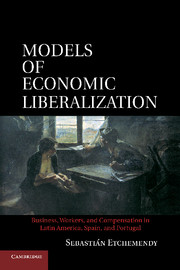 Models of Economic Liberalization
Models of Economic Liberalization Book contents
- Frontmatter
- Contents
- Acknowledgments
- Part I The Intellectual Terrain
- Part II The Political Economy of Business Adjustment
- 3 Compensating Business Insiders
- 4 Statist and Corporatist Models of Business Adjustment in Spain and Argentina
- 5 Exceptions That Prove the Rule
- Part III The Political Economy of Labor Adjustment
- Part IV The Market Model
- Part V Comparative Perspectives in Ibero-America
- 10 Conclusions
- Appendix
- Bibliography
- Index
3 - Compensating Business Insiders
The Origins of Statist and Corporatist Models in Spain and Argentina
from Part II - The Political Economy of Business Adjustment
Published online by Cambridge University Press: 07 October 2011
- Frontmatter
- Contents
- Acknowledgments
- Part I The Intellectual Terrain
- Part II The Political Economy of Business Adjustment
- 3 Compensating Business Insiders
- 4 Statist and Corporatist Models of Business Adjustment in Spain and Argentina
- 5 Exceptions That Prove the Rule
- Part III The Political Economy of Labor Adjustment
- Part IV The Market Model
- Part V Comparative Perspectives in Ibero-America
- 10 Conclusions
- Appendix
- Bibliography
- Index
Summary
Introduction
Beginning in the early 1980s and 1990s, respectively, Spain and Argentina underwent bold projects of market transformation. In addition to the policies aimed at stabilizing the currency and curbing inflation, liberalization programs involved trade reform and integration into regional markets, industrial privatization, and attempts to deregulate the labor market in the two countries. In contexts of fixed exchange rates and increasing currency overvaluation, these policy reforms resulted in the widespread disappearance of local firms, massive layoffs, and a pronounced rise in unemployment. In neither Spain nor Argentina, however, were the sectoral realignments triggered by these seismic transformations simply left to the operation of market forces. Rather, the government shaped market outcomes by providing some kind of policy compensation to particular groups of industrial firms and formal sector workers that were potential losers from reform. to explain business-state relations during trade reform, sectoral deregulation, and industrial privatization, all of which were key components of industrial adjustment. This chapter concentrates on the national patterns, that is, the origins of the dominant compensatory strategies for industrial business in Argentina and Spain. studies particular industries compensated in order to give a closer assessment of the causal factors at work. will analyze core ISI sectors that deviate from the pattern of adjustment prevalent in Argentina and Spain in a way that is, or so I argue, coherent with the explanatory framework presented in the book.
Even though both countries had undertaken attempts at liberalization before the 1980s, it was under the administrations of Menem in Argentina (1989–99) and González in Spain (1982–96) that the model of development became fundamentally reoriented toward the market. The governments, however, pursued radically different paths of industrial adjustment in terms of (1) a dominant pattern of policymaking (state dirigisme in Spain vs. formal or informal concertation with particular business groups in Argentina) and (2) a defined set of compensatory measures geared toward particular industrial firms (subsidy allocation in Spain vs. market-share compensation in Argentina). The main consequences of these alternative types of industrial adjustment were the initial consolidation of the compensated segments of the Argentine industrial bourgeoisie and the disappearance of traditional firms and industrial groups that had constituted the core of the Spanish industrial class ().
- Type
- Chapter
- Information
- Models of Economic LiberalizationBusiness, Workers, and Compensation in Latin America, Spain, and Portugal, pp. 53 - 87Publisher: Cambridge University PressPrint publication year: 2011


